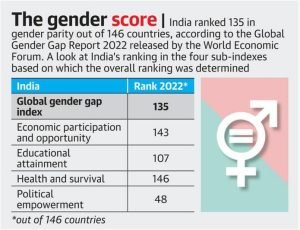Gender Social Norms Index
Published by: UNDP
About
- Track people’s attitudes towards women in four dimensions: political, educational, economic and physical integrity.
Findings
- Nearly 90% of people still hold at least one bias against women.
- Political: Approximately half of the world’s population believes men make better political leaders, while two in five believe men make better business executives.
- Economic: Approximately half of the world’s population believes men make better political leaders, while two in five believe men make better business executives.
- Countries with higher bias in gender social norms witness a significant disparity in domestic chores and care work.
- Women spend nearly six times more time on these tasks than men, limiting their opportunities for personal and professional growth.
- Physical Integrity: 25% of people believe it is justified for a man to beat his wife, revealing deep-rooted biases.
- Education: The recent increase in education achievements has not translated into better economic outcomes and opportunities for women.
- The lack of progress in gender social norms coincides with a decline in the Human Development Index (HDI).

National Digital Nagrik Forum
- It is an online platform with the mission of advancing the rights of businesspeople, consumers, and other societal groups while influencing public policy to improve the digital trade economy.
- Through expert discussions and educational resources, the forum aims to increase public understanding of digital legislation and assist in enhancing individuals’ capacity to participate in innovation.
- Goal: To influence the discussion of policy surrounding trade in the digital economy in India in order to support the government’s goal of building a trillion-dollar digital economy while preserving an open, trustworthy, and responsible internet ecosystem.
- It will host awareness campaigns, online and offline dialogues, trainings, and targeted outreach to stakeholders in the public, corporate, and nonprofit sectors. It will focus on five core themes.
- The first pillar consists of consumer protection and online safety with a core focus on efficient grievance redressal.
- The pitfalls of digital cartelisation and how a level-playing field is necessary to discourage discriminatory and anti-competitive practices in the online world are part of the second pillar.
- Third, the potential of Indian digital technologies to not only transform retail and industrial trade but also boost employment and expand the investment footprint.
- Fourth, a first principles-based taxation policy that encourages certainty and productivity, especially for sectors with high growth potential, while preventing illegal activities such as tax evasion and money laundering.
- Finally, the forum will study emerging technologies, such as blockchain and artificial intelligence, to assess their impact on retail trade and, at the same time, safeguard consumers’ interests.
